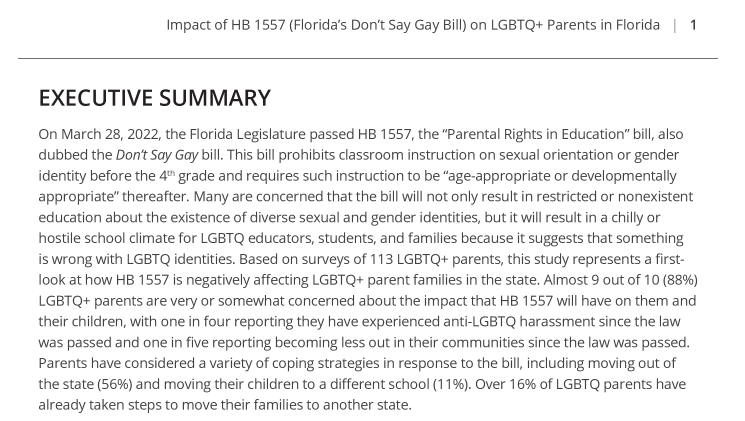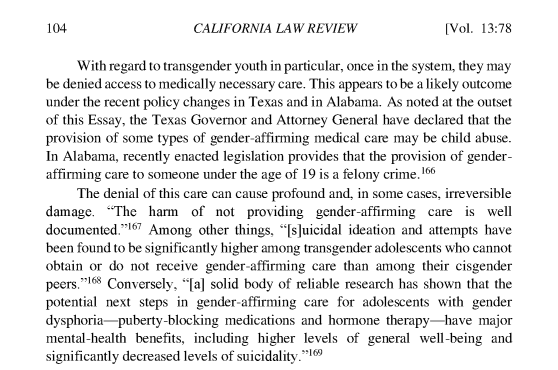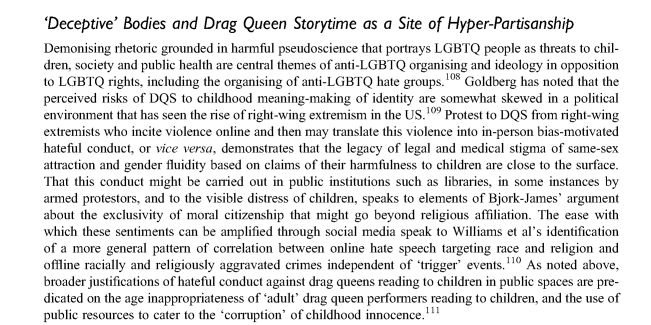From laws preventing mentions of gender identity or sexual orientation in classrooms, to proposals to ban gender-affirming care for youth, to even prohibiting drag shows, there are new laws cropping up designed to restrict rights for transgender people across the country. Historically, LGBTQ+ members of American society have been marginalized, and transgender individuals have faced decades of discrimination. Particularly in the past few months, several states have passed laws designed to limit transgender expression, much to the frustration of LGBTQ+ individuals and allies.
Education Laws: Don’t Say Gay
Last year, Florida governor Ron DeSantis signed a law—commonly referred to as “Don’t Say Gay”[1]Abbie E. Goldberg. Impact of HB 1557 (Florida’s Don’t Say Gay Bill) on LGBTQ+ Parents in Florida (2023). This document can be found in HeinOnline’s LGBTQ+ Rights database.—banning educators from teaching students about sexual orientation or gender identity in schools from kindergarten through third grade. The education board is additionally considering extending that law to grades four through 12.

Other states have passed similar laws. For example, Alabama prohibits public schools from discussing gender identity or sexual orientation from kindergarten through fifth grade,[2]Clifford Rosky, Don’t Say Gay: The Government’s Silence and the Equal Protection Clause, 2022 U. ILL. L. REV. 1845 (2022). This article can be found in HeinOnline’s Law Journal Library database. while Arkansas recently passed legislation prohibiting instructors from covering these topics before fifth grade. Similar laws restricting LGBTQ+ content in schools have been filed in 16 states.
Gender-Affirming Care
Gender-affirming care is any sort of surgical or nonsurgical health care that helps enhance gender identity, and it can be used by trans, nonbinary, and cisgender individuals. It includes hormone therapy, genital or breast reconstruction, counseling and psychiatric services, and other treatments.[3]Jennifer Levi & Kevin Barry, “Made to Feel Broken”: Ending Conversion Practices and Saving Transgender Lives, 136 HARV. L. REV. 1112 (2023). This article can be found in HeinOnline’s Law Journal … Continue reading These services are backed by the American Academy of Pediatrics, American Medical Association, and the Endocrine Society as proven, effective, and safe.

According to UCLA School of Law’s Williams Institute, as of March 2023, 30 states have restricted access to gender-affirming care for minors or are considering laws to do so.
States with bans include:
- Alabama
- Arizona
- Arkansas
- Georgia
- Florida
- Iowa
- Mississippi
- South Dakota
- Tennessee
- Texas
- Utah
Legislation is pending in several other states, including:
- Hawaii
- Idaho
- Indiana
- Kansas
- Kentucky
- Michigan
- Missouri
- Montana
- Nebraska
- New Hampshire
- New Jersey
- North Carolina
- North Dakota
- Ohio
- Oklahoma
- Oregon
- South Carolina
- Washington
- West Virginia
Across these states, there are nearly 145,000 transgender youth that won’t or may not have access to gender-affirming care. For more information from the Williams Institute, you can check out a whole subcollection from this leading LGBTQ+-focused research group in HeinOnline’s LGBTQ+ Rights database
In Texas, laws passed earlier this year classify gender-affirming care for youth as child abuse,[4]169 Cong. Rec. S1007 (2023). This document can be found in HeinOnline’s U.S. Congressional Documents database. allowing child welfare agents to investigate parents who allow their children to receive this treatment. In Oklahoma, restrictions ban gender-affirming care for anyone under 25. In South Carolina, trans adults 21+ must receive a doctor and psychiatrist referral before undergoing care. Meanwhile, in Florida, puberty blockers, cross-sex hormones, and surgical procedures would be banned for any new patients under age 18 and won’t be covered under Medicaid.[5]Maia Zelkind & M. Currey Cook, Impact of Anti-LGBTQ+ Legislative and Executive Branch Action on Children’s Well-Being, 25 Child. Rts. Litig. 14 (2022). This article can be found in HeinOnline’s ABA Law Library … Continue reading
Drag Shows
Tennessee recently became the first state to criminalize drag shows, or “adult-oriented performances” including “male or female impersonators,” performed in public spaces, in the presence of children, or within 1,000 feet of schools, places of worship, or public parks. At least 14 other states have introduced anti-drag bills. For example, in Arizona, there is a bill in the House that would subject any drag performer who performs in front of children[6]Justin R. Ellis, A Fairy Tale Gone Wrong: Social Media, Recursive Hate and the Politicisation of Drag Queen Storytime, 86 J. CRIM. L. 94 (2022). This article can be found in HeinOnline’s Law Journal Library. under 15 to at least 10 years in prison, as well as registration as a sex offender. In Oklahoma, violators of the proposed anti-drag bill would face felony charges, fines up to $20,000, and two years of jail time.
Meanwhile, Texas has four anti-drag bills in consideration, including one that requires that any space that allows for a drag performance—cafes, restaurants, shops, etc.—would need to identify as a “sexually-oriented business” and comply with all of the corresponding rules and regulations for such businesses.

Transgender Athletes
Each state has its own laws regarding participation of transgender athletes in sports—and in many states, trans athletes are not allowed to participate in sports organizations that coincide with their gender identity due to arguments over whether or not transgender women have a physical advantage over cisgender women. For example, several states have laws that ban transgender women from participating in girls’ and women’s sports at public schools. In 2022 alone, Arizona, Indiana, Iowa, Kentucky, Louisiana, Oklahoma, South Carolina, South Dakota, and Utah[7]24 LEGAL Issues COLLEGIATE Athletics 1 (2023). This article can be found in HeinOnline’s Law Journal Library. all passed such laws. The most recent state to ban transgender atheltes from women’s sports is Kansas, where the House overrode a veto on the bill from Governor Laura Kelly on April 5.
Many other states have strict regulations regarding the process that transgender athletes must go through before being allowed to participate on teams coinciding with their gender identity. This may include hormone therapy, maintaining certain levels of testosterone, healthcare documentation, etc.
Continue Your Research in HeinOnline’s LGBTQ+ Rights
As part of our perpetually free Social Justice Suite, HeinOnline’s LGBTQ+ Rights is a collection of materials relating to the gay rights movement in America, including an interactive timeline and subject-coded court cases, scholarly articles, books, pamphlets, reports, and more. This database is automatically included in all HeinOnline Core subscriptions. If you do not have a Core subscription and want to learn more about LGBTQ+ rights in America, register for a Social Justice Suite subscription today to continue researching the progress that has been made and the work that still needs to be done in ensuring civil rights for the entire LGBTQ+ community.
HeinOnline Sources[+]
| ↑1 | Abbie E. Goldberg. Impact of HB 1557 (Florida’s Don’t Say Gay Bill) on LGBTQ+ Parents in Florida (2023). This document can be found in HeinOnline’s LGBTQ+ Rights database. |
|---|---|
| ↑2 | Clifford Rosky, Don’t Say Gay: The Government’s Silence and the Equal Protection Clause, 2022 U. ILL. L. REV. 1845 (2022). This article can be found in HeinOnline’s Law Journal Library database. |
| ↑3 | Jennifer Levi & Kevin Barry, “Made to Feel Broken”: Ending Conversion Practices and Saving Transgender Lives, 136 HARV. L. REV. 1112 (2023). This article can be found in HeinOnline’s Law Journal Library. |
| ↑4 | 169 Cong. Rec. S1007 (2023). This document can be found in HeinOnline’s U.S. Congressional Documents database. |
| ↑5 | Maia Zelkind & M. Currey Cook, Impact of Anti-LGBTQ+ Legislative and Executive Branch Action on Children’s Well-Being, 25 Child. Rts. Litig. 14 (2022). This article can be found in HeinOnline’s ABA Law Library Collection Periodicals database. |
| ↑6 | Justin R. Ellis, A Fairy Tale Gone Wrong: Social Media, Recursive Hate and the Politicisation of Drag Queen Storytime, 86 J. CRIM. L. 94 (2022). This article can be found in HeinOnline’s Law Journal Library. |
| ↑7 | 24 LEGAL Issues COLLEGIATE Athletics 1 (2023). This article can be found in HeinOnline’s Law Journal Library. |



